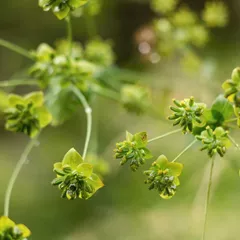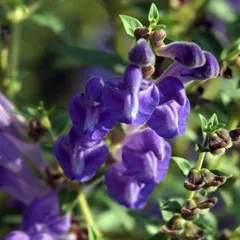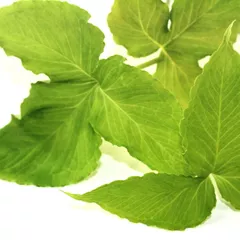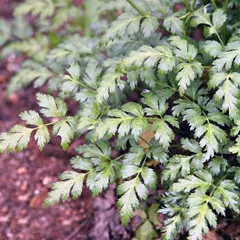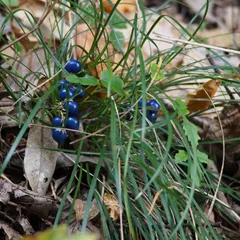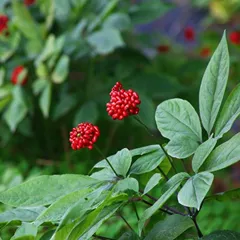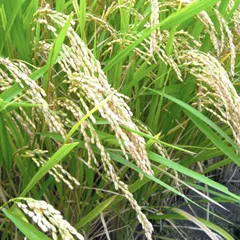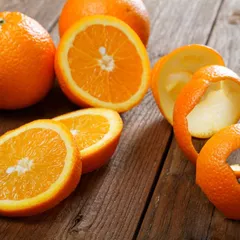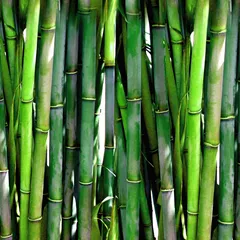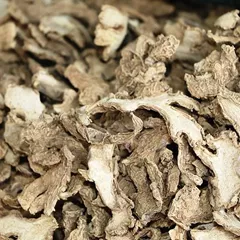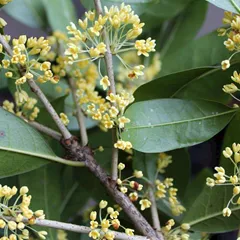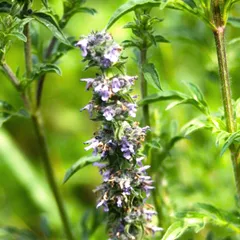Xuan Fu Dai Zhe Tang
Xuan Fu Dai Zhe Tang
Chinese: 旋覆代赭汤
Pinyin: Xuán Fù Dài Zhě Tāng
Other names: Inula and Hematite Decoction

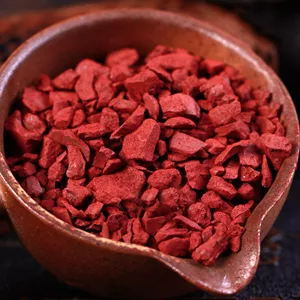
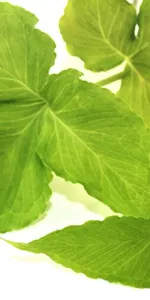
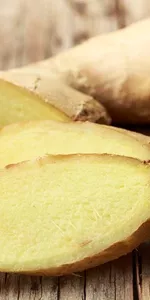
Xuan Fu Dai Zhe Tang
Xuan Fu Dai Zhe Tang
Chinese: 旋覆代赭汤
Pinyin: Xuán Fù Dài Zhě Tāng
Other names: Inula and Hematite Decoction
Number of ingredients: 7 herbs
Formula category: Formulas for a rebellious Qi
Conditions for which it may be prescribed: HiccupsGastroptosisGastrectasis and eight other conditions
- Regulates the downward flow of Stomach Qi
- Expectorant, treats hiccups
Contraindications: Contraindicated for morning sickness
Source date: 220 AD
Source book: Discussion of Cold Damage
The information provided here is not a replacement for a doctor. You shouldn't use it for the purpose of self-diagnosing or self-medicating but rather so you can have a more informed discussion with a professional TCM practitioner.
Xuan Fu Dai Zhe Tang is a 7-ingredient Chinese Medicine formula with Inula Flowers (Xuan Fu Hua) as a principal ingredient.
Invented in 220 AD, it belongs to the category of formulas for a rebellious Qi. Its main actions are: 1) regulates the downward flow of Stomach Qi and 2) expectorant, treats hiccups.
In Chinese Medicine health conditions are thought to arise due to "disharmonies" in the body as a system. These disharmonies are called "patterns" and the very purpose of herbal formulas is to fight them in order to restore the body's harmony.
In this case Xuan Fu Dai Zhe Tang is used by TCM practitioners to fight patterns like Rebellious Qi, Phlegm-Fluids in the Stomach and Small intestine or Rebellious Liver Qi invading the Stomach. From a Western Medicine standpoint, such patterns can give rise to a range of conditions such as hiccups, chronic gastritis or gastroptosis for instance.
On this page, after a detailed description of each of the seven ingredients in Xuan Fu Dai Zhe Tang, we review the patterns and conditions that Xuan Fu Dai Zhe Tang helps treat.
The seven ingredients in Xuan Fu Dai Zhe Tang

Xuan Fu Hua is a king ingredient in Xuan Fu Dai Zhe Tang. Like the name indicates, it means it has more power than other ingredients in the formula.
1. Inula Flowers (Xuan Fu Hua)
In general Xuan Fu Hua's main actions are as follows: "Moves Stagnant Phlegm in the Lungs. Reverses the flow of Rebellious Qi of the Lungs and Stomach."
In the context of Xuan Fu Dai Zhe Tang, it is used because it is able to drive Rebellious Qi downward as well as dissolve Phlegm.
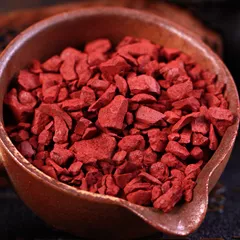
Dai Zhe Shi is a deputy ingredient in Xuan Fu Dai Zhe Tang. This means it helps the king ingredient(s) treat the main pattern or it serves to treat a coexisting pattern.
2. Hematite (Dai Zhe Shi)
Part used: The mineral
Nature: Cold
Taste(s): Bitter
Meridian affinity: StomachHeartLiverPericardium
Category: Herbs that anchor and calm the Spirit
Dai Zhe Shi has a sinking nature and strongly suppresses Rebellious Qi. Strengthening the downward-directing rather than the Phlegm-transforming action of Inula flower (Xuan Fu Hua) is a reflection of the fact that the primary focus of this formula is on subduing Rebellious Qi in order to control the symptoms of belching, hiccup, and vomiting.
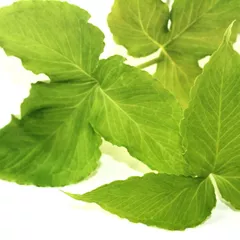
Ban Xia is an assistant ingredient in Xuan Fu Dai Zhe Tang. This means that it either serves to reinforces the effect of other ingredients or it moderates their toxicity.
3. Crow-Dipper Rhizomes (Ban Xia)
Part used: Dried rhizome and tuber
Nature: Warm
Taste(s): Pungent
Ban Xia works together with Fresh ginger (Sheng Jiang), another assistant herb here, to warm and harmonize the Stomach and direct Qi downward, thereby dispelling the Phlegm and dispersing the focal distention.

Sheng Jiang is an assistant ingredient in Xuan Fu Dai Zhe Tang. This means that it either serves to reinforces the effect of other ingredients or it moderates their toxicity.
4. Fresh Ginger (Sheng Jiang)
In general Sheng Jiang's main actions are as follows: "Relieves the Exterior and disperses Cold. Warms and circulates Qi in the Middle Burner. Calms a restless fetus and treats morning sickness. Treats seafood poisoning."
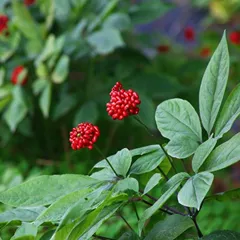
Ren Shen is an assistant ingredient in Xuan Fu Dai Zhe Tang. This means that it either serves to reinforces the effect of other ingredients or it moderates their toxicity.
5. Ginseng (Ren Shen)
Part used: Dried root
Nature: Warm
Meridian affinity: HeartLungSpleen
Category: Tonic herbs for Qi Deficiency
Ren Shen works together with Liquorice (Gan Cao) and Jujube dates (Da Zao) to tonify the Deficient Qi and strengthen
the Spleen and Stomach. By supporting the middle Qi, they assist in its recovery and help protect it against further harm from the dispersing properties of the other ingredients in the formula.
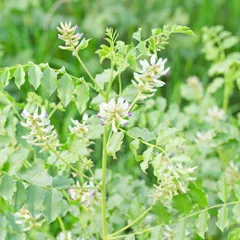
Gan Cao is an assistant ingredient in Xuan Fu Dai Zhe Tang. This means that it either serves to reinforces the effect of other ingredients or it moderates their toxicity.
6. Liquorice (Gan Cao)
Part used: Dried root and rhizome
Nature: Neutral
Taste(s): Sweet
Meridian affinity: HeartLungSpleenStomach
Category: Tonic herbs for Qi Deficiency
In general Gan Cao's main actions are as follows: "Tonifies the Basal Qi and nourishes the Spleen Qi. Clears Heat and dispels toxicity. Moistens the Lungsexpel phlegm and stop coughing. Relieves spasms and alleviates pain. Harmonizes and moderates the effects of other herbs."
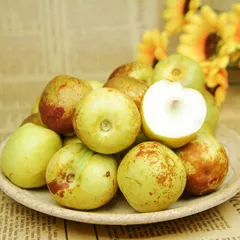
Da Zao is an assistant ingredient in Xuan Fu Dai Zhe Tang. This means that it either serves to reinforces the effect of other ingredients or it moderates their toxicity.
7. Jujube Dates (Da Zao)
Part used: Dried ripe fruit
Nature: Warm
Taste(s): Sweet
Meridian affinity: SpleenStomach
Category: Tonic herbs for Qi Deficiency
In general Da Zao's main actions are as follows: "Tonifies the Spleen and Stomach Qi. Tonifies the Blood. Calms the Shen (spirit). Moderates the actions of other herbs in formula."
Conditions and patterns for which Xuan Fu Dai Zhe Tang may be prescribed
It's important to remember that herbal formulas are meant to treat patterns, not "diseases" as understood in Western Medicine. According to Chinese Medicine patterns, which are disruptions to the body as a system, are the underlying root cause for diseases and conditions.
As such Xuan Fu Dai Zhe Tang is used by TCM practitioners to treat four different patterns which we describe below.
But before we delve into these patterns here is an overview of the Western conditions they're commonly associated with:
Hiccups Chronic gastritis Gastroptosis Gastrectasis Peptic ulcers Chronic hepatitis Incomplete pyloric obstruction Esophageal spasms Esophageal cancer Gastric cancer Meniere's disease
Again it wouldn't be correct to say "Xuan Fu Dai Zhe Tang treats hiccups" for instance. Rather, Xuan Fu Dai Zhe Tang is used to treat patterns that are sometimes the root cause behind hiccups.
Now let's look at the four patterns commonly treated with Xuan Fu Dai Zhe Tang.
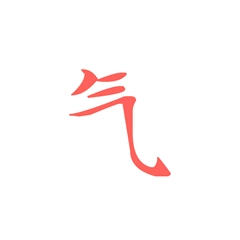
Qi is one of Chinese Medicine's vital subtances. Learn more about Qi in Chinese Medicine
Rebellious Qi
Pulse type(s): Wiry (Xian)
Tongue color: Normal (light red), Red sides
Symptoms: Nausea Asthma Belching Vomiting Coughing Diarrhea Insomnia Hiccuping Headaches Restlnessness
Xuan Fu Dai Zhe Tang is sometimes prescribed by TCM practitioners to treat Rebellious Qi. This pattern leads to symptoms such as hiccuping, belching, nausea and vomiting. Patients with Rebellious Qi typically exhibit wiry (Xian) pulses as well as a normal (light red), red sides tongue.
Rebellious Qi is an Excess/Full condition and it is another form of Qi Stagnation. In this case, Qi flows in the wrong direction from the normal physiological one for a given Organ or Channel.
The Organs whose Qi should descend are Stomach, Lungs, Heart, Small Intestine, Large Intestine, Kidneys... read more about Rebellious Qi
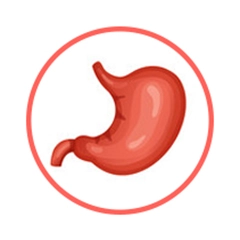
The Stomach is a so-called "Fu" Organ. Learn more about the Stomach in Chinese Medicine
Phlegm-Fluids in the Stomach and Small intestine
Pulse type(s): Deep (Chen), Slippery (Hua), Wiry (Xian)
Tongue coating: Sticky coating
Tongue shape: Swollen
Symptoms: Dizziness Dry tongue Weight loss Loose stools Chest fullness Vomiting of watery fluids Splashing sound in the stomach Abdominal distention and fullness Dry mouth with no desire to drink
Xuan Fu Dai Zhe Tang is sometimes prescribed by TCM practitioners to treat Phlegm-Fluids in the Stomach and Small intestine. This pattern leads to symptoms such as abdominal distention and fullness, vomiting of watery fluids, dry tongue and dry mouth with no desire to drink. Patients with Phlegm-Fluids in the Stomach and Small intestine typically exhibit deep (Chen), slippery (Hua) or wiry (Xian) pulses as well as Swollen tongue with white slippery or yellow sticky coating.
Phlegm-Fluids is a type of Substantial Phlegm characterized by white, very watery and thin sputum. It can sometimes actually be heard splashing in the body.
Phlegm-Fluids in Stomach and Intestines simply refers to a pattern whereby Phlegm-Fluids accumulates in those Organs. It often does so when... read more about Phlegm-Fluids in the Stomach and Small intestine
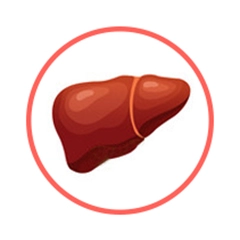
The Liver is a so-called "Zang" Organ. Learn more about the Liver in Chinese Medicine
Rebellious Liver Qi invading the Stomach
Pulse type(s): Weak (Ruo), Wiry (Xian)
Symptoms: Belching Hiccuping Weak Limbs Irritability Epigastric pain Frequent sighing Hypochondrial pain Sour regurgitation Nausea or vomiting Epigastric distension Hypochondrial distention A feeling of oppression in the epigastrium
Xuan Fu Dai Zhe Tang is sometimes prescribed by TCM practitioners to treat Rebellious Liver Qi invading the Stomach. This pattern leads to symptoms such as irritability, epigastric pain, epigastric distension and hypochondrial pain. Patients with Rebellious Liver Qi invading the Stomach typically exhibit weak (Ruo) or wiry (Xian) pulses.
Liver Qi is said to be rebellious when its horizontal movement is accentuated. This interferes with the descending of Stomach Qi, making it ascend instead. Hence the symptoms of belching, nausea and vomiting. It is one of the reason causing Rebellious Stomach Qi.
Rebellious Liver Qi also impairs... read more about Rebellious Liver Qi invading the Stomach

The Stomach is a so-called "Fu" Organ. Learn more about the Stomach in Chinese Medicine
Stomach Qi Deficiency with Phelgm
Pulse type(s): Empty (Xu), Wiry (Xian)
Tongue coating: Thick white coating
Symptoms: Hiccuping Regurgitation Nausea or vomiting Unremitting belching Hard epigastric focal distention
Xuan Fu Dai Zhe Tang is sometimes prescribed by TCM practitioners to treat Stomach Qi Deficiency with Phelgm. This pattern leads to symptoms such as unremitting belching, hiccuping, regurgitation and nausea or vomiting. Patients with Stomach Qi Deficiency with Phelgm typically exhibit empty (Xu) or wiry (Xian) pulses as well as a tongue with thick white coating.
Formulas similar to Xuan Fu Dai Zhe Tang
Xiao Chai Hu Tang is 71% similar to Xuan Fu Dai Zhe Tang
Ban Xia Xie Xin Tang is 57% similar to Xuan Fu Dai Zhe Tang
Mai Men Dong Tang is 57% similar to Xuan Fu Dai Zhe Tang
Ju Pi Zhu Ru Tang is 57% similar to Xuan Fu Dai Zhe Tang
Huang Lian Tang is 57% similar to Xuan Fu Dai Zhe Tang
Jin Fei Cao San is 56% similar to Xuan Fu Dai Zhe Tang

